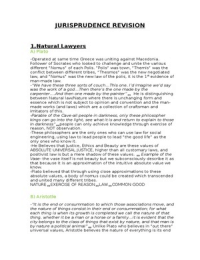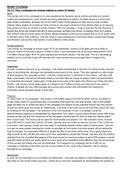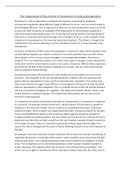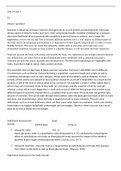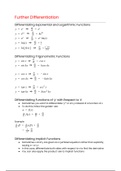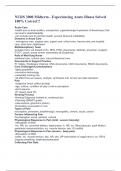1. Natural Lawyers
A) Plato
-Operated at same time Greece was uniting against Macedonia.
Follower of Socrates who looked to challenge and unite the various
different “Nomus” of each Polis. “Polis” was town, “Themis” was the
conflict between different tribes, “Thesmos” was the new negotiated
law, and “Nomus” was the new law of the polis, it is the 1st evidence of
man-made law.
-“We have these three sorts of couch…This one, I’d imagine we’d say
was the work of a god…Then there’s the one made by the
carpenter….And then one made by the painter” He is distinguishing
between Natural law/Nature where there is unchanging form and
essence which is not subject to opinion and convention and the man-
made works (and laws) which are a collection of craftsman and
imitators of this.
-Parable of the Cave-all people in darkness, only these philosopher
kings can go into the light, see what it is and return to explain to those
in darkness”people can only achieve knowledge through exercise of
reason, NOT observation.
-These philosophers are the only ones who can use law for social
engineering, using law to lead people to lead “the good life” as the
only ones who know it.
-He Believes that Justice, Ethics and Beauty are these values of
ABSOLUTE UNIVERSAL JUSTICE, higher than all customary laws, and
positivist law is but a mere shadow of these values. Example of the
Vase- the vase itself is not beauty but we subconsciously describe it as
that because it is an approximation of the intuitive absolute value we
know.
-Plato believed that through using close approximations to these
absolute values, a body of nomus could be created which transcended
and united many different tribes.
NATUREEXERCISE OF REASONLAWCOMMON GOOD
B) Aristotle
-“It is the end or consummation to which those associations move, and
the nature of things consist in their end or consummation; for what
each thing is when its growth is completed we call the nature of that
thing, whether it be a man or a horse or a family…it is evident that the
city belongs to the class of things that exist by nature, and that man is
by nature a political animal” Unlike Plato who believes in “out there”
universal values, Aristotle believes the nature of everything is its end
, product—“Teleological” view of things “Nature makes nothing
without some end in view, nothing to no purpose”
- Using this exercise, he believes man’s end nature is to be a sociable
and political animal, therefore he achieves his nature when operating
in a great society
-Leading from this, all law must always be for the common good and
enable happiness and well being, which in turn means political
discourse and structured society
Outlines two types of justice/law”The natural is that which has the
same validity everywhere and does not depend upon acceptance; the
legal is that which in the first place can take one form or another
indifferently, but which, once laid down, is decisive” appears to
confuse himself here as he is suggesting that justice is variable whilst
natural law is unchangeable- what I actually think he is saying is that
“justice” through man made law is changeable because we are weaker
beings who can fall foul to opinion and subjectivity, whereas natural
law made by gods are not….but he is stressing that even still despite
our flaws, we can all at our core recognise irrefutable truths.
-Like Plato, believed only philosophers exercising reason could make
this law and that all law must be for common good in practical
sense….Builds on Plato by saying that use of reason in order to know
natural law will enable humans to improve and approximate their
positivist law.
- Aristotle was more practical than Plato and focused more on how
human law could approximate to natural law, rather than Plato’s focus
on what universal values were, although this was still his concern.
Natural Law flourished post Aristotle, coinciding with the expansion of
huge societies following Alexander the Great’s empire and the Roman
Empire expansion
C) Cicero
-“Law in its proper sense is right reason in harmony with nature…There
will not be one such law in Rome and another in Athens, one now and
another in the future, but all peoples at all times will be embraced by a
single and eternal and unchangeable law…” Much the same as
Plato/Aristotle that there are unchangeable values which are natural
law.
-“For our species is not made up of solitary individuals or lonely
wanderers…” agrees with Aristotle that our nature and purpose is to
be social and political animals
-“Plato constructed a state which was desirable rather than feasible”—
whilst agreeing with platos premise of natural law and universal values,
his aim is to outline practical system of law.
-“According to the best authorities law was not thought up by the
intelligence of human beings, nor is it some kind of resolution passed
by communities but rather an eternal force which rules the world by
the wisdom of its commands and prohibitions”echoes Platos view
-“It is insane to suppose that things are matters of opinion and not
grounded in nature” very critical of early forms of positivism

